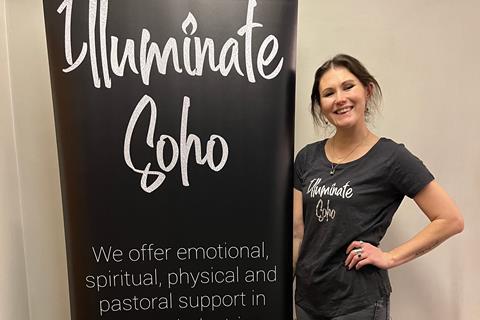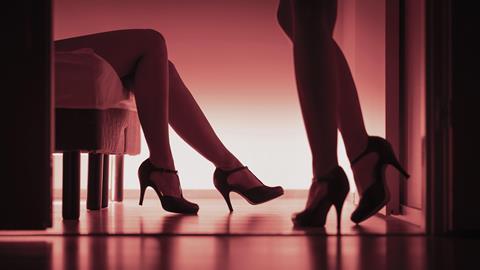Alex Noel discovers the connections chaplains are making as they see God move in unexpected places
Chaplains may be synonymous with hospitals, prisons and schools but they’re not limited to these settings. In many workplaces and institutions, they offer vital pastoral support, bolstering mental, emotional and spiritual wellbeing. You can now find them in Premier League football clubs and even some supermarkets. However, one space you might not expect to find a chaplain is in a strip club.
According to urban sociologist Ray Oldenburg, in his 1989 book The Great Good Place (Paragon House), society has three ‘places’. Home, the workplace and public spaces – like cafés, pubs, nightclubs, libraries, gyms, parks and theatres. He calls the latter ‘third places’, where we gather or form community in order to foster social interactions in real life.
It’s an area that Third Space, a Christian ministry to central London’s nightlife scene, with its plethora of venues and nightclubs, has been exploring for several years. Madison Kinzley coordinates Third Space’s strip club chaplaincy, called ‘Illuminate Soho’. She feels strongly that every space needs chaplaincy. But why strip clubs? “Something that we talk about a lot at Third Space is we want to see God moving in the least expected places”, she says.
Venturing into new ground
It’s in London’s Soho that the UK’s strip clubs have their origins. Since the 1920s and 30s the area has been increasingly characterised by the overlap between the entertainment and sex industries. But despite being such a fixture, there was little Christian presence within them.
When Illuminate Soho started in 2017, its founders spent 18 months praying in and around Soho, for the whole sex industry and strip clubs in particular. While there are lots of ministries for women involved in prostitution, there was nothing being developed for women working in strip clubs: “so there was a real vision to connect [with them] and bring light in an area that had so much darkness”. When Madison took on her role in 2021, she re-pioneered the ministry: “after the pandemic we needed to re-establish the connection into the clubs, expand the team, rebuild”, she says. And prayer is the “most important element” of what they do. She attributes the access they’ve been given by the strip clubs to those carefully laid foundations – but above all to the favour of God.
Madison’s prayerful approach and experience has created opportunities to share learnings with others – such as Holy Trinity Brompton, where Sam Coates is senior leader alongside husband Archie. As Sam prepared to move back to HTB in 2022 from St Peter’s, Brighton, a friend had prayed for her continued ministry to women, saying: “‘you’re countercultural [and] you’re called to be light in the darkness’”. So, when an opportunity arose to expand HTB’s ministry to include women working in strip clubs she knew she was called to become a chaplain. Sam spent some time with Madison’s team to find out more. Through HTB’s national network the vision is to see strip club chaplains available in towns and cities across the UK, which Madison is excited about: “I love the idea of seeing [chaplains] in strip clubs across the UK…I want every girl working in these environments to have that.”
Who do you find within strip clubs?
For many strippers there is a clear differentiation between dancing in a strip club and working in other areas of the industry. Not only is it seen as more glamorous, it’s considered to be worlds apart from other sex work – especially prostitution. It therefore attracts women with more ambitious values and strong motives. And for good reason; stripping can offer many women a viable income, and a genuine business opportunity. It can help pay for college or university, support a family or provide for a certain lifestyle and standard of living. Its depiction in films, TV shows and on social media reinforces its association with luxury lifestyles and wealth. And the ‘stripper aesthetic’ has been widely adopted in fashion and music, with its inherent message of sexual freedom and self-empowerment. Despite this, a majority of public opinion sees stripping as sex work, which carries with it a certain stigma (see yougov.co.uk/society/articles/48773-what-does-britain-think-of-sex-work-and-sex-workers). And it can become an entry point for other work like escorting or forms of pornography.
The diversity of women dancing in strip clubs reflects the broad tastes of the clients who visit them. There is no stereotype – despite what the media can portray. Women generally vary in age between 18 and 40, and it’s unlikely to see anyone older, especially in the higher-end or ‘Gentlemen’s clubs. The industry leans towards vitality and youthfulness and, inevitably, there is a shelf-life for working as a stripper.

Changing regulations and trends
The 1990s saw a proliferation of lap-dancing clubs, offering customers more intimate interactions with dancers than standard striptease. Licensing rules introduced in the 2000s treated them like any other bar or club, which led to a boom in the industry. But numerous issues followed, and under the Policing and Crime Act 2009, strip clubs were reclassified as sexual entertainment venues. This allowed heavier regulation by local authorities, making strip clubs subject to greater licensing restrictions, including no-contact rules. Strip clubs were required to reapply for ‘sex establishment licences’ each year, which councils can refuse on a range of grounds. Feminist groups and women’s rights campaigners in cities across the UK state that strip clubs are ‘sanctioned sexism’ objectifying and diminishing women (prospectmagazine.co.uk/society/38722/the-naked-truth-about-strip-clubs). They urge local councils to adopt a ‘nil-cap’ policy, advocating for all clubs to be permanently closed. But the counter-argument is that this puts women who work as strippers at huge risk, as the fact that strip clubs are regulated does offer women a better degree of safety. Aware of the realities of the industry, Madison is conscious that women face danger working outside the clubs and doesn’t want to see them come to harm: “I personally have a fear that if [they] close down all the clubs it’s not going to stop the [whole] industry from continuing. It’s just going to move it into a darker position.”
They see us as a benefit and a resource all around, because we focus on the girls
Strip clubs have not escaped wider trends. Between 2012 and 2022 the number in England and Wales fell from around 350 to 150 – many facing closure as a result of rising rents and gentrification. This was only exacerbated by the pandemic, which sent activity online and saw the explosion of platforms like OnlyFans, which now has over four million creators posting mild to extreme sexual content.
Supporting those who work at the clubs
By offering chaplaincy, Illuminate Soho wants to help bring some light. Strip club managers share with Madison that the dancers look forward to seeing the chaplains, saying: “The girls are so much happier when you come.” And if there are ever any questions about the treatment of the women, the clubs can demonstrate unequivocally to the council and licensing authorities that they’re serious about their wellbeing: “I think they see us as a benefit and a resource all around, because we focus on the girls. But we’re also there for the managers and the security.” Each strip club is its own microcosm, and chaplains build relationships with everyone who works there – from the bouncers on the door to the security staff, bar staff and hostesses, DJ, the ‘house mum’ (who looks after the dancers) and manager. Even the owners.
So, what does a typical evening look like for strip club chaplains? It often starts in a local café: “There are usually about five or six of us on a team in one night.” They catch up about happenings in the week – including ‘paint and sip evenings’, special events (like Valentine’s Day) or workout sessions for the women. “Everything I’m developing is for them outside the club. I actually spend the smallest amount of time with them in the club,” says Madison, who is also part of YWAM and has use of their premises for these events. The team prays and then two of them will break off to visit a strip club, while the rest continue to pray. When the two arrive, they chat with the bouncers, before being invited in.
Inside everything is designed to stimulate the senses – the music, lighting and, of course, the entertainment. The women appear body-confident and bold and, wearing minimal clothing to begin with, they perform and entertain until late at night. The work can be competitive, and requires a certain level of resilience and drive.
The chaplains are all women and rarely engage with clients at all. Madison’s team goes straight into the dressing rooms – a true ‘third space’ for the strippers within their working environment. They chat and share homemade treats and are not there to evangelise – on that they’re very clear: “‘We come as chaplains offering mental health checks, emotional wellbeing checks. If there are any concerns or safeguarding things, [the women are] welcome to talk with us about that”, and she indicates they will take any appropriate steps. If anyone in the team is asked for help or guidance with issues such as housing, they will signpost to other services, respectful of the women’s own prerogative and self-determination. This can include possible training and options for work beyond stripping too.
Despite not being there to evangelise, those on the team are open and honest about their Christian faith and are often referred to as the ‘church girls’. They will readily offer prayer to the women, many of whom are open to spirituality and hungry to find truth. In the last three years Madison has seen ten strippers come to faith in the clubs.
Sharing stories – and empathy
Among Illuminate Soho’s volunteers is Bobbi Kumari, who has been a chaplain since the beginning. She had also volunteered with Third Space’s nightlife ministry and was then drawn to the strip club chaplaincy: “I came out of a super hedonistic, promiscuous lifestyle…it was mainly clubbing…taking Class A drugs, one-night stands.” While working for a mergers and acquisitions company, she and her colleagues would entertain clients at strip clubs. Attracted to the scene, she had explored becoming a dancer herself before coming to faith. Being a strip club chaplain is now part of her own redemption story, and a way to demonstrate God’s love: “[we] value and cherish them where they are at in that moment of time”.
They will readily offer prayer to the women there, many of whom are open to spirituality and hungry to find truth
For Madison, it connects on a deeper level too: “I’ve always had a heart to work with women in this industry…to help [them] find value and be able to make their own healthy decisions in whatever direction they feel is correct for them.” Originally from the States, Madison had a chaotic upbringing. Her parents were separated, and she spent time in different households, surrounded at times by drug and alcohol addiction, and abusive personalities. When her mum had another baby, Madison helped out and did a lot around the house while her mum was working: “there are elements of that that made me have to grow up really fast”. She struggled with an eating disorder, as well as bouts of anxiety and depression. But when she found God, life changed: “I became aware that Jesus was with me, and I wasn’t surviving my life on my own.”
Today, Madison and Bobbi and the other chaplains empathise with the women’s experiences without judgement. They are not easily surprised or shocked and know personally the value of having people to trust. And as they share their own stories, many of the strippers will in turn open up, revealing concerns, insecurities and needs that all women can face.
Strip club chaplaincy isn’t about strippers. It’s about women and the environments they find themselves in. The chaplains aren’t trying to be ‘saviours’. They want to see women flourish, and, as they provide chaplaincy, they are seeing God move in profound ways: “Who knew that God would be so present in strip clubs? It’s wild”, says Madison. The reason for this? “I think God goes where there’s hunger.”
Learn more about Illuminate Soho at thirdspaceministries.co.uk and on Instagram @illuminatesoho. And about HTB’s expanding ministry to women at htb.org/ministryupdate


































No comments yet